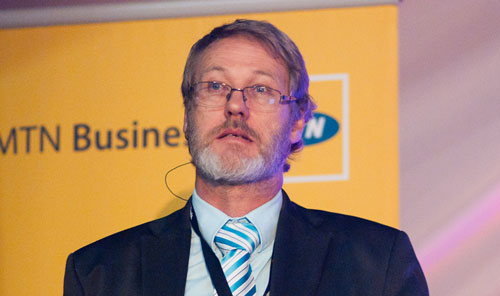
As a result of expanding mobile network coverage, the biggest challenge facing SA as it tries to get more people online is the affordability of connectivity and devices, not network speeds.
That’s the view of Independent Communications Authority of SA (Icasa) councillor William Stucke, who was speaking at the Internet Service Providers’ Association’s annual iWeek conference on Wednesday.
“We have near universal population coverage, 97% of the population have GSM/Edge access. It’s not broadband, but it’s a start.”
Rural data usage is doubling every six months. “For 2G, 60% of all traffic is data, and for 3G it’s 90%. By 2015, the Middle East and Africa will have strongest mobile data traffic growth of any region,” Stucke says.
The greatest problem of access “is not so much a digital divide as an affordability gap”.
“Despite [inflation] … telecommunications prices have halved in the last three years, and there has been a 27% reduction in retail prices in first five months of 2011 alone,” says Stucke.
He says these reductions cannot be attributed entirely to Icasa, but the regulatory authority has played a role. But he warns government’s 2020 100% access goal remains difficult to achieve.
It’s also important not to underestimate the value of Internet access for education, particularly self-education, and that in terms of Maslow’s hierarchy of needs, access allows for “self-actualisation”, Stucke says. “It also allows for freedom of speech, which leads to independent, well-informed and well-rounded individuals who know what they want.”
Echoing a comment from former Microsoft CEO Bill Gates, Stucke says the Internet “strengthens and deepens our democracy”. Local and national government needs to harness the potential it offers for driving democracy.
Stucke says Internet access also promotes online business, which in turn benefits both buyers and sellers. He says online business is good for consumer rights and allows smaller sellers to compete with larger ones.
Citing a Cisco Broadband Commission report, Stucke says that in China, a 10% increase in broadband access translates into as much as a 2,5% increase in GDP. “This figure is 1,38% in Africa. This is a significant issue for Africa, which is aiming for 6% growth.”
Internet access also allows for tertiary and other traditional forms of education. Stucke says a great example is Moodle, an open-source solution for online training that has 37m users.
“However, it’s important to discern between reliable sources and utter twaddle,” he says. Internet education doesn’t compensate for basic literacy and numeracy skills, and that SA still needs to focus on these issues in schools. — Craig Wilson, TechCentral
- Subscribe to our free daily newsletter
- Follow us on Twitter or on Facebook
- Visit our sister website, SportsCentral (still in beta)

